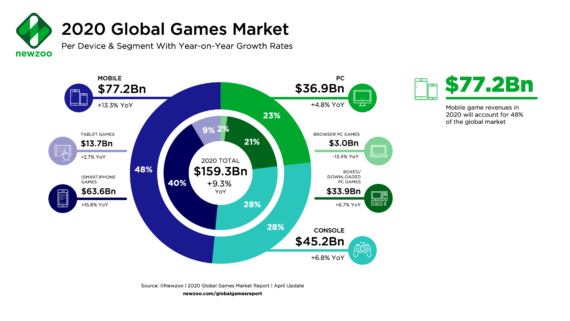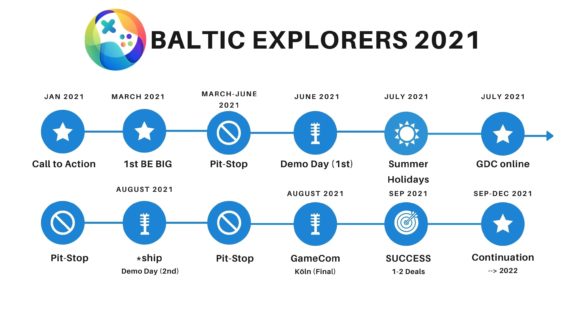Baltic Explorers – the creation of a new version of the accelerator program with a twist
On the picture above, it is clear to see that the gaming environment is a strong growth industry. The gaming industry is an environment that is growing at an exponential rate. The COVID-19 pandemic seems not to affect the industry as hard as others. The explanation and justification for this matter are the reason for its boost since years gaming is a trend, and many companies are developing more exciting and challenging games.
 The technology is arising strongly; it is believed that many VR-tools have been under the Christmas tree in the year 2020. The gaming industry impacts other industries like retailing, entertainment, and film. When you look at those kinds of stats, it makes the gaming industry the fifth largest globally, and the biggest in places like Europe as a whole. Technology development is a critical fact in the chain; it is easy to use when downloading a game to your devices.
The technology is arising strongly; it is believed that many VR-tools have been under the Christmas tree in the year 2020. The gaming industry impacts other industries like retailing, entertainment, and film. When you look at those kinds of stats, it makes the gaming industry the fifth largest globally, and the biggest in places like Europe as a whole. Technology development is a critical fact in the chain; it is easy to use when downloading a game to your devices.
 In 2020 the Finnish gaming industry celebrated its 25th anniversary. A lot has been changed in these years, platforms, technology, and the business environment around gaming. The significant change has been in improving game developers and their teams’ professionalism. There have been more than 600 companies; the most active year was 2014 with 260 active studios. However, that number has dropped since then. In 2019, the industry broke €2 billion.
In 2020 the Finnish gaming industry celebrated its 25th anniversary. A lot has been changed in these years, platforms, technology, and the business environment around gaming. The significant change has been in improving game developers and their teams’ professionalism. There have been more than 600 companies; the most active year was 2014 with 260 active studios. However, that number has dropped since then. In 2019, the industry broke €2 billion.
The gaming industry is considered one of the most exciting tech industries because of its importance to culture, entertainment and technological improvement. According to Business insider magazine (10/2019), The gaming industry encourages innovation by continually pushing the borders of what is thinkable, driving companies like Google and Microsoft to create new technology to serve the billions of gamers worldwide. In fact, according to Microsoft, there are more than two billion gamers around the world. (https://www.businessinsider.com)
All these facts show the growth is a continuation in the future; gaming is a sustainable and successful business, many opportunities ahead, and possibilities to catch a deal are high, cause of the Finnish gaming industry’s outstanding reputation.
With that knowledge and network, the Baltic Explorers project is designed to develop the Central Baltic gaming cluster to a more competitive and sustainable institution for the future.
BE BIG – An accelerator program
The program will be developed to fulfil all the requirements needed in all four partner countries. The end target will be to make them ready to catch deals at the US and Asian Market.

The Baltic Explorers project organizes an international event hosted in 4 different Baltic Sea Region counties for two days. It will be a hybrid event and organized in all partner countries simultaneously. The event’s uniqueness will allow us to fully customize the content for our gaming companies’ needs and demands. Previous research gave us the idea of which topics will be necessary; each partner country has different application requirements. We will also focus on the gaming company level; we will create a valuable service chain for our clients with these methods.
We provide our participants with:
– business development support
– pitch deck development support
– pitching support
– game development support
– a wide range of international mentors
– finding additional team members (if needed and wished) support
– tickets to larger events in the US and Asian markets
The project target by the end of 2022 will be the achievement of 5-7 deals on the international market; and a contribution rate in events organized by Baltic Explorers of 110 gaming companies participation.
More Information:
Sabine Suorsa
Project Manager
South-Eastern Finland University of Applied Sciences (Xamk)
Digital Economy
+358 44 7028901
sabine.suorsa@xamk.fi
www.balticexplorers.eu
Sources:
Text info: Neogames http://www.neogames.fi/wp-content/uploads/2019/04/FGIR-2018-Report.pdf
Cover picture: Daria Nikulina, 2020
Figure1: NewZoo, 2020
Figure2: Roadmap – Sabine Suorsa, 2021
![]()
![]()
